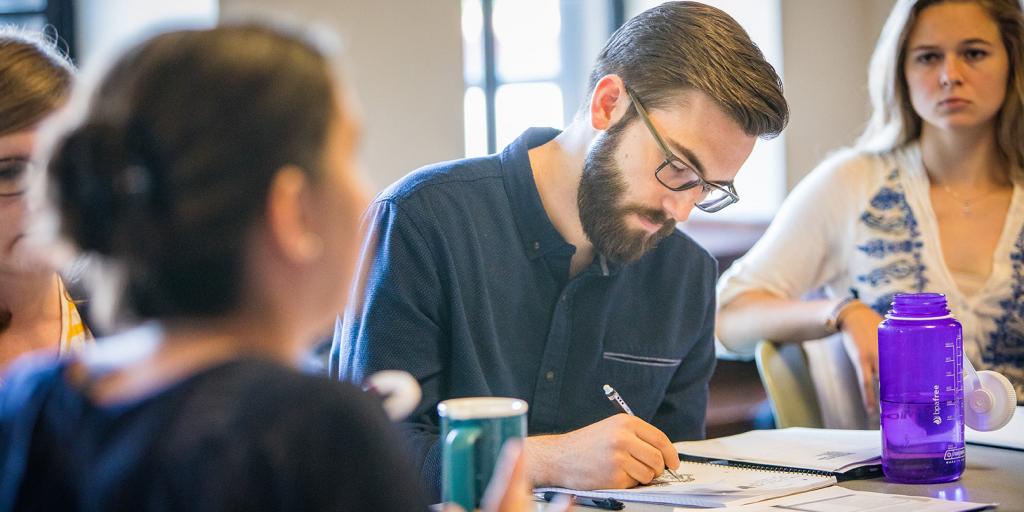

Required Courses
Thomas Aquinas argues that teachers uniquely move back and forth between the contemplative life and the active life. First, they love and pursue the truth about certain objects or fields of knowledge. Second, they attempt to nurture a comparable love and understanding within their students. This course addresses these two moments in the classical teacher’s life by reflecting on the educator’s person and pedagogy, as well as the classroom culture these create. First, we will address the attributes and abilities of classical educators. For instance, teachers must practice leisured wonder, nurture a hungry intellectual appetite, and maintain a devotion to excellence. They require virtues like patience, humility, and courage. They must understand the grammar, logic, and rhetoric of their discipline, and be able to help students come to the same understanding. In short, teachers must be the kinds of persons they will apprentice their students to become. Second, we will explore how classical pedagogy and practices, structured space, assignments and assessment, rules and discipline, and the general “culture” of a classroom can nurture the integrated moral, intellectual, aesthetic, and affective formation of students.
Teaching is an art, also known as a craft or a techné. The goal of this course is to move teachers toward mastering the craft of classical teaching. The end of a traditional craft is a well-made object—a table, cabinet, or home. The end of the craft of teaching is more than a well-formed lesson or course, but a well-formed student who has cultivated his or her knowledge, skills, virtues, and loves. Because of this, teachers are like artisans who practice a “stochastic art” or an ars auxilians, similar to doctors who nurture bodies to heal themselves and farmers who help soil grow crops. In these art forms, mastery of the craft does not guarantee success because of the variables that remain outside the artisan’s control. Even so, doctors, farmers, and teachers must know their crafts as well as they can in order to attend to each body, field, or student before them. In this course, we will consider how teaching is a craft, examine basic principles and goals of teaching, reflect on the contemporary culture in which we practice our craft, and explore a set of pedagogical practices from the classical liberal arts tradition.
The question of ‘the Good Life’ is one of the most basic and enduring human questions, perennially asked by anyone who cares about the well-being of themselves or their neighbors. It includes a cluster of constitutive questions: How ought I to live? What is the good and the right? How do I form a virtuous character and avoid a vicious one? What nurtures and inhibits human flourishing? How do I live well with God, my neighbor, myself, and the non-human creation? How do I order what I love? This course examines how these questions have been explored and embodied by select philosophers, theologians, and poets like Plato, Aristotle, Augustine, Dante, Kant, and others. This course will also consider how various moral ideas and systems affect the practical ways we live and the decisions we make.
Core Courses
This first course in the history of education explores antiquity to the Medieval Era, emphasizing ancient Greek, ancient Roman, early Christian, Medieval, and Renaissance influences on education.
This second course discusses the history of education during the Modern era (1500-present), emphasizing the Reformation, Pietism, Enlightenment, the nineteenth-century development of the nation state and the research university, the rise of the social sciences, and the more recent developments of the twentieth century.
Along with goodness, beauty, and justice, the nature and pursuit of truth is central to Western culture and civilization. This course engages questions about truth, knowledge, belief, and intellectual virtue as these ideas have been developed within the classical, Christian, modern, and contemporary traditions. Students will dialogue with each other and with representative philosophers and theologians like Aristotle, Aquinas, Descartes, Hume, and Reid, among others. Understanding the nature of knowledge and the intellectual virtues needed to pursue truth in common with others is essential for flourishing in religiously and philosophically plural societies and institutions. Therefore, this class will also address the practical implications of these ideas and their impact on the role of the citizen, student, and teacher.
This course reflects on the educational role of aesthetics, including whether or not aesthetic appreciation can be taught, and (if it can) how this might be done. Assuming the ongoing validity of God’s pronouncing all things “very good” (Gn 1.31), we therefore ask (1) how beauty has been defined through the ages; (2) whether or not there may be universal standards of beauty; (3) how we recognize human beauty (e.g., in architecture, art, landscape, literature, music, poetry) and beauty in the larger, non-human created order (including, e.g., mathematics); and (4) why being able to recognize and appreciate beauty relates to and is crucial for our becoming fully human.
We will also ask how the ability to apprehend beauty relates to the virtue of the ordo amoris, and how both we and our students can learn to feel “pleasure, liking, disgust, and hatred at those things which really are pleasant, likeable, disgusting, and hateful” (Lewis, Abolition of Man). Readings from the Bible and Plato through the late twentieth century form the basis for our conversations, as well as opportunities to explore and experience beauty through concerts, museums, architecture, and so forth.
In this course, we will explore the notions of human dignity inherent in different understandings of what it is to be a person. Always in view will be how these varying understandings of dignity and personhood treat persons with various disabilities—physical and mental. Are they kept, in philosopher Raimond Gaita’s phrase, ‘fully among us’? Or do our very definitions of personhood exclude certain human beings? How do theological reflections affect our understanding of disability and the possibilities for grace and revelation contained therein? Are there secular means for keeping persons with disabilities ‘fully among us’? Within the context of such reflections, we will begin to think about our calling to educate students with special needs. In particular, we will spend time thinking about contemporary approaches to disability generally, and reflect on how classical education might particularly serve as a model for restoring humanity to special education.
Education is often shaped by a culture’s dominant understanding and expectations of childhood, adolescence, and emerging adults. This course explores anthropological, philosophical, theological, and literary texts in order to understand changing views of “the young person,” or as they are commonly called, “emerging adults.” We will read passages from the Odyssey, Hebrew Scripture, Augustine’s Confessions, and Rousseau’s Emile, among other classical and contemporary texts. The course also identifies how these changing views impact education and society more generally. It aims to help students address the following questions: How did different eras view children and adolescents? When did our current understandings emerge, why, and are they helpful? What philosophies or theologies of personhood are embedded in various understandings of children and childhood? How might these views impact our practice of teaching and mentoring emerging adults?
Elect Among
Reading is an activity prone to both peril and blessing. It means letting words into our hearts which have the power to move us, shape our imagination, direct our thinking, and ultimately form our souls—or deform them. Hence in the classical tradition literature, poetry, and fiction have always invited criticism and stood in need of defense. Plato’s argument that poets should be expelled from the just city has elicited various responses explaining how literature can be good for us, which form the backbone of classical approaches to literary reading. This course will provide an entry point into the centuries-long discussion on this issue, then turn to approaches to reading the Bible that take account of its literary character while highlighting its power to form us.
Dr. Angel Adams Parham of the University of Virginia offers this course as a visiting professor. The great tradition ought to be read in conversation with great writings by diverse authors who draw upon their unique experiences and ways of being in and seeing the world. Students will engage with Frederick Douglass, W.E.B. DuBoise, Anna Julia Cooper, Marva Collins, and other educators and intellectuals who knew the tradition, used it to understand and overcome injustices and hardships, and wove it together with their African and African American heritage.
Under the direction of an MAT Fellow
Under the direction of an MAT Fellow
This course reviews classical methods and materials appropriate for teaching adolescents. Students will develop their understanding of classical pedagogical techniques and develop their teaching skills through mentoring, observations, and seminars. The entire course operates on the Judeo-Christian conviction that the human person bears the image of God, that therefore each person brings the gift of him or herself to the classroom, and also that each person ought to be directed toward what is highest and most noble. This course includes field experiences in the major academic area in middle or secondary schools.








